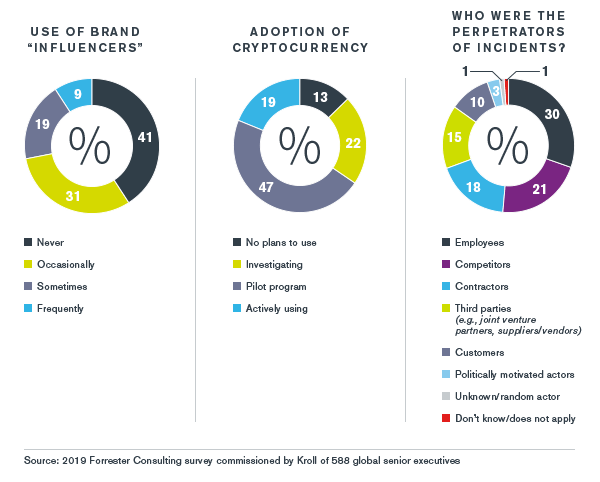Survey answers from respondents in Russia reveal how companies there are confronting risks in the context of still-emerging regulation and fluid cultural norms.
The percentage of survey respondents in Russia reporting significant effects from bribery and corruption is lower than in any country but Japan (16 percent vs. 23 percent globally). While bribery and corruption are commonly cited by foreign companies as a challenge when doing business in Russia, the survey findings may reflect that the Russian government’s efforts to combat commercial corruption are perceived to be having an effect. In addition, given the amount of discussion there has been regarding this topic in the Russian business community, the survey results may also indicate a certain level of “corruption fatigue,” in which respondents no longer see this as a new and salient issue.
It is also notable that respondents in Russia were far less likely than those anywhere else to report being victims of adversarial social media activity (9 percent vs. 27 percent globally). Russia is not without online concerns, however: Respondents there are more likely than those anywhere else to report that they never use brand influencers (41 percent vs. 22 percent globally).

Respondents in Russia are consistently skeptical of the effectiveness of their internal detection mechanisms. For example, they are less likely than average to consider their compliance programs effective in detecting incidents (66 percent vs. 75 percent globally). Accordingly, respondents give below-average marks to their organizations’ culture of transparency and accountability. Only 66 percent of respondents in Russia say their due diligence of third parties is effective (vs. 73 percent globally). Responses from Russia also indicate that companies are less likely than average to conduct reputational due diligence–an increasingly important part of the due diligence process–on suppliers and customers. Even more notably, they are far less likely to perform reputational due diligence on candidates for board director seats and senior executive positions (77 percent vs. 91 percent globally). Although only 53 percent of Russian organizations call their whistleblowing programs effective (vs. 66 percent globally), incidents in Russia are detected by whistleblowers at an above-average rate (17 percent vs. 13 percent globally).
As in most other countries, employees were the most common source of threats (30 percent vs. 24 percent globally). But in Russia, competitors were the second most frequently cited perpetrator (21 percent vs. 14 percent globally). This may reflect some companies’ aggressive use of lawsuits, complaints to authorities and other tactics to derail rivals.
Looking ahead, Russian respondents are no more likely than their international peers to express concern about most emerging threats–and are often significantly less likely to do so. However, Russians worry about the possibility of large-scale, coordinated cyberattacks at a far higher rate than respondents almost anywhere else (75 percent vs. 68 percent globally).
